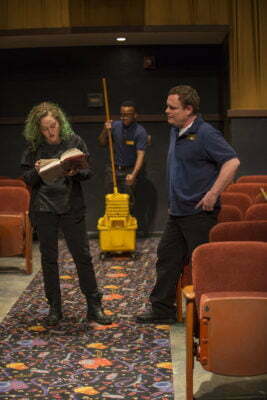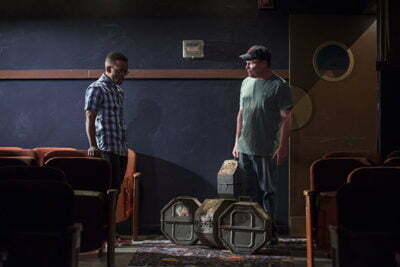The Flick
By Annie Baker
Directed by Dexter Bullard
Produced by Steppenwolf Theatre Company, Chicago
Annie Baker Goes to the Dark Side
Annie Baker is a relatively young playwright who has become known for her ear for dialogue. Her “Vermont Plays” Body Awareness, The Aliens, and Circle Mirror Transformation were quiet and captured the absurd humor of mundane conversations, while demonstrating her keen sense of perception. They were also deeply humanistic; each of them is about lovable losers in New England who grow before the audience by bonding with each other and gleaning bits of wisdom until they become the balanced, compassionate people most of us aspire to be. Therefore Baker’s drama The Flick, for which she won the Pulitzer Prize in 2014, is a great shock. In it, Baker uses all her familiar tools—the realistically written conversations that are mostly silences and inanities, the small, impoverished New England setting, the idiosyncratic characters—to depict the grueling process of peoples’ humanity being ground out of them. Think the Sprecher sisters’ Clockwatchers, but with sticky floors. The Flick’s Chicago premiere at Steppenwolf, under the direction of Dexter Bullard, is long and feels longer. It seems that to understand soul-crushing grind of the cinema-staff’s lives, we must be put through an abbreviated version of the same process.

Avery (Travis Turner) is a new hire at The Flick, one of only eight movie theatres in all of Massachusetts that still uses old-fashioned film. In fact, the 35mm projector is what attracted him to working at The Flick while he is on break following a suicide attempt from the college where his father is a professor of semiotics. Avery is a huge movie buff, and astonishes the other floor-sweeper, Sam (Danny McCarthy), with his encyclopedic knowledge and snobbery. He also completely lacks social skills or any other interests, and is well aware of it. Sam doesn’t usually mind Avery’s depressed bitterness as long as it doesn’t make him flaky. The older man’s thirty-five, has no college degree, and can’t even get promoted to run the projector. He uses guilt to try to get what he wants, and when Avery asks him what he wants to be when he grows up, he responds that that’s the most depressing question he’s ever been asked. Only slightly less disappointed with her lot in life is the projectionist, Rose (Caroline Neff), who has nothing to show for being tens of thousands of dollars in debt to a no-name college. She casually declares she has a drinking problem, and Avery can’t tell whether she’s joking or not. We never do know for sure.

The theatre is obviously on its last legs. (Jack Magaw’s scenic design even includes cobwebs on the lighting fixtures). Rose and Sam tell Avery that the owner refuses to install a credit card payment system because cash is easier to conceal from family court, and this makes it easier for employees to steal, too. Although, it’s not really theft, because they are too underpaid for their full-time work to survive (Sam lives in his parents’ attic). Avery doesn’t need the money, and being black, isn’t so sure he’d be allowed to get away with as much, but Rose and Sam badger him into joining in. The three interact with each other tentatively, and open up as much out of boredom as anything else. Sam reveals that he loves Rose, but Rose prefers Avery. Avery freezes up at any attempt at intimacy; he tells an unknown person on the phone that he believes he’ll always be depressed, lonely, and live with his father, and should just accept it. Still, over the course of the ninety-minute long first act, the three develop some affection for each other. They’d have to for the story to unfold the way it does in the ninety-minute second act, since loathing comes from betrayal and disappointment, not ordinary dislike.

Baker gives plenty of warning about the length of the play. The opening overture, which plays in the dark, is about five minutes long. Bullard and the actors are well-attuned to her style. Despite Baker being one of the most specific living playwrights about punctuation, pauses, and syntax, the actors are so totally enveloped in her characters that not one movement or sound is anything less than believable. The lulls in conversation are those of real-life, whether the silences be comfortable or not. Sometimes people don’t want to talk to each other, sometimes there’s nothing to say. And yet, there’s a lot of humor. Much of it is dark, but occasionally, someone will tell an amusing story or make an insightful comment. A few silences are to allow for laughs, and there are plenty to be had early on. But the story gets darker, or perhaps the characters and audience are forced to acknowledge the despair that was always lurking just beneath the surface. Finding a discarded shoe or a weird sleeping guest (Will Allan) is mildly interesting the first time it happens, then it becomes stale, then it becomes just another memory of degradation that stands out amid all the boredom and low-level nastiness of the floors and bathrooms.

A slow-burn works very differently in live theatre than in other mediums. You can put down a book or pause a movie, but there’s no escaping the artists’ pace in theatre (assuming everyone in the audience goes along with conventional etiquette). That’s one of the controversial aspects of The Flick that Steppenwolf’s promotional materials are designed to prepare audiences for. The bigger issue is what a depressing purpose this play’s burn serves. Sam, Rose, and Avery believe their lives will never improve, even when their jobs at The Flick inevitably come to an end. The play takes us into their minds to show why they, and by implication, most young people who labor relentlessly for little or no pay, believe they have no future. They also come to realize that there is no solace to be found in each other; they can only give each other more bad debt. The Flick clearly communicates the pervasive feeling among the younger generation, and perhaps, many older people as well who sacrificed pleasure for careers and got neither. Is it enjoyable to experience? Well, there’s humor and recognition, but self-recognition in a play like this isn’t enjoyable. Unusually for Baker, no empathy between characters can survive in this work, and it’s left to the audience to either inject some or change the world to make The Flick impossible. The play has no explicit politics, but this campaign season, people need to understand that drudgery isn’t dramatic. It looks like this.
Recommended
Jacob Davis
[email protected]
Reviewed February 13, 2016
For more information, see The Flick’s page on Theatre in Chicago.
Playing in Steppenwolf’s Upstairs Theatre, 1650 N Halsted St, Chicago. Tickets are $20-89; to order, call 312-335-1650 or visit Steppenwolf.org. Performances are through May 8. Running time is three hours and ten minutes with one intermission.

